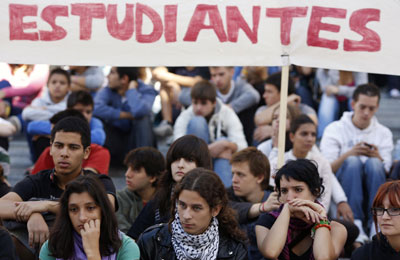
Students protest against education
cuts in Seville, Spain.
IMF urges Italy, Spain to seek aid
Milan, October 17, 2012
The International Monetary Fund called on the eve of a European Union summit for both Spain and Italy to seek euro zone assistance to draw a line under the bloc's debt crisis, but Rome has rebuffed the idea and Madrid seems likely to apply alone.
The two-day Brussels summit will debate steps towards a single banking supervisor and proposals for closer euro zone integration, including German Finance Minister Wolfgang Schaeuble's idea of a super-commissioner with veto powers over national budgets.
No decisions are expected this week and there is no certainty as to when Spain will come off the fence.
Spain dodged a bullet on Tuesday when Moody's maintained its credit rating at investment grade, with a negative outlook, on the assumption that Madrid will trigger European Central Bank intervention soon to lower its borrowing costs.
Spanish and Italian bond yields fell in response, while the euro strengthened to a one-month high against the dollar.
IMF chief economist Olivier Blanchard told an Italian daily that the euro area was close to having all necessary measures in place to ensure Spain and Italy can keep borrowing in the markets while they implement painful economic reforms.
"In the short-term it would be crucial to have a plan for the two countries of the (euro zone) periphery," Blanchard told Il Corriere della Sera in an interview published on Wednesday.
"This would include not only an ongoing process of adjustment inside the countries but also a guarantee they can fund themselves. This would be conditional on them sticking to their commitments.
"We are almost there but not quite at that point yet," he said.
Senior Spanish and euro zone sources have indicated Madrid is preparing to request a precautionary credit line from the euro zone rescue fund in the coming weeks -- a move that could start ECB bond-buying once Spain agreed on policy conditions.
Italian Prime Minister Mario Monti said last week a Spanish request could be enough to calm markets. He has repeatedly said Rome does not need assistance for itself.
GERMAN RESISTANCE WANES
Resistance from EU paymaster Germany to a credit line for Spain is waning, sources in contact with top German policymakers said, although any decision is likely to come at the earliest at a Nov. 12 finance ministers' meeting and perhaps later.
By then, EU and IMF officials should have completed a report on Greece's compliance with its second international bailout, paving the way for an urgently needed 31 billion euro ($40.4 billion) aid tranche to keep Athens afloat.
The longer-term outlook for Greece remains clouded, with German leaders rejecting any write-down of its debt to official lenders or any additional euro zone funding while softening to the idea of giving Athens more time to meet its fiscal targets.
Spain has said it should have to meet no new conditions to receive a credit line, seen at around 50 billion euros, since it is fulfilling all the EU's policy recommendations for deficit-cutting and economic reforms.
However, a senior euro zone source involved in high-level negotiations on the debt crisis said Madrid might be asked to reform its pensions system and break the link with inflation, which economists say is an unsustainable fiscal burden.
"Technical preparations are being made. Germany and Spain still have dilemmas but we need to move on and stabilise the euro zone," the source said.
Conservative Prime Minister Mariano Rajoy has said pensions are the last thing he would touch, but his government has held off until next month a final decision on whether to pay an inflation catch-up of some 3 percent due in January.
Separately, the government has also said it would revise the sustainability factor of the pension system, which may lead to accelerating a planned increase in the retirement age to 67 from 65.
MONTHLY SUMMITS?
Debate about the future shape of the EU intensified ahead of the summit, for which the heads of four European institutions have drafted guidelines on future integration including a possible separate euro zone budget and binding contracts on policy reforms with euro zone countries.
A senior German official told reporters that Chancellor Angela Merkel fully shared Schaeuble's call for a new currency commissioner with powers to enforce budget discipline on euro states.
French President Francois Hollande appealed for more efforts to boost growth across the euro area, warning that recession was as big a threat as budget deficits.
Hollande, loath to change the EU's treaty for fear of a risky referendum, called instead for monthly summits of euro zone leaders to coordinate economic policy.
In what sounded like a plea to Germany, Hollande told the daily Le Monde that euro zone states should have the leeway to stimulate internal demand with salary rises and tax cuts, adding that a longer-term goal must be to reduce the big differences in borrowing costs in the bloc.
"If we don't breathe some life into Europe's economy, budget discipline measures won't work," Hollande was quoted as saying.
Germany, Europe's biggest economy, is increasingly feeling the pinch of the euro zone crisis at home, and the government cut its 2013 growth forecast to 1 percent from 1.6 percent.
"Germany is navigating stormy waters because of the European sovereign debt crisis and an economic weakening in emerging nations in Asia and Latin America," Economy Minister Philipp Roesler said in a statement. - Reuters







